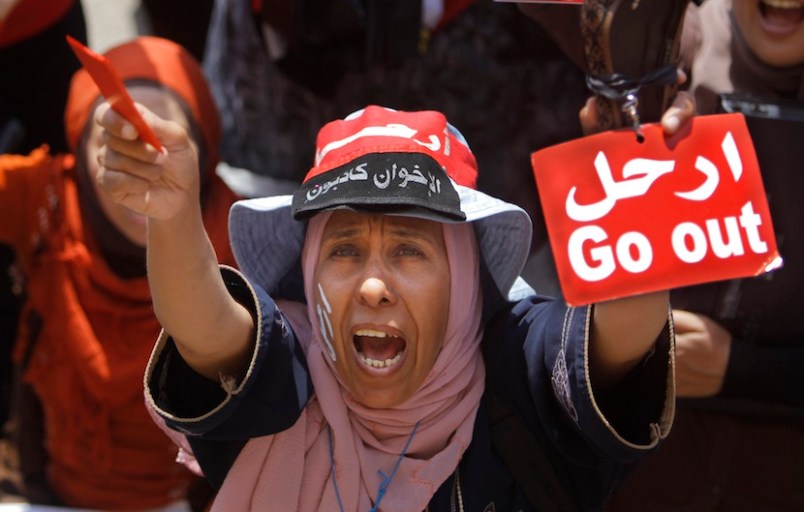Like many of you I’ve been using Twitter, among other sources, to follow and try to make sense of the on-going situation in Egypt. And yesterday I saw a tweet from a very knowledgable observer of Egyptian politics and culture (an Egyptian national living in Egypt, to be clear) write something that, quite simply, showed a really weak grasp of US politics. It made me realize once again how difficult it is for the vast majority of us to make sense at any deep level of what’s happening in a country like Egypt. And by ‘we’ in this case I think means me and virtually everyone else stateside who hasn’t either spent a good deal of time in Egypt or studied the country or at least the Arab Middle East in some depth.
Two countries yelling at each other across the electromagnetic spectrum is a bit better but not wildly better than an English speaker and an Arabic speaker, neither knowing the other’s language, making a heated effort to settle some major dispute by arguing it out. Loudly.
I got on this kick when I noticed what I have to say is one of the most fascinating and weirdest developments in Egypt’s now week long coup/revolution/uprisingthing. There are a lot of people in Egypt who aren’t just mad at Morsi and upset with the US for not more forcefully supporting his ouster. Many actually think the US is actively supporting a Muslim Brotherhood takeover of the country. And just to be certain we’re crystal clear: I don’t mean supporting Morsi and the Brotherhood as the legitimate government because they won a fairly free national election. I mean a conspiracy to help the Brotherhood take over the country, even to the extent of rigging the election that brought him to power.
This is actually something we covered in some depth last year. But the best capsule summary I’ve found is this piece by Robert Mackey in the Times’ Lede blog. The upshot is this: we all know all the whackadoodle conspiracy theories from the right about Obama being a secret Muslim. But there’s also a more specific sub-whackadoodlism pushed by members of Congress and a group of DC-based Islamophobe activists that argues that the Obama administration has actually been infiltrated by Islamists in sympathy with the Muslim Brotherhood.
Like I said, we covered this last year and I remembered it pretty vividly. But I didn’t grasp until this weekend how far it had spread within Egypt or how prevalent an assumption it had become within the anti-Morsi protest community.
Most of this comes from the Frank Gaffney world, allied with the usual suspects in Congress: Gohmert, Bachmann, et al. You’ll probably remember the charges about Huma Abedin, Hillary’s Clinton’s longtime assistant/advisor and, weirdly enough, Anthony Weiner’s wife. There’s been a long series of accusations that she’s a Brotherhood plant at the heart of Obama administration foreign policy making. The charges became so widespread that John McCain felt it necessary to go to the Senate floor to defend her.
There are many, many other examples of this kind of craziness. Abedin is only one high-profile example. But the key point is that what most of us here take as fringe Crazy has germinated into a full-fledged set of conspiracy theories in Egypt, perhaps one of the most astounding Internet era feedback loops yet seen.
Now, the US gets accused of a lot of things. Many of them true. Are we an empire trying to dominate the world? Well, sort of? Certainly under the last chief. But in real ways under the current guy too. But hey, aren’t we in a global war against Islam not it’s secret supporters? Or isn’t that at least supposed to be the idea. In any case, joking around. But you get the idea.
But there’s also another part of the equation.
Take a look at this very interesting piece by Michael Hanna from February of this year. No one with their head screwed on right seriously thinks the US or President Obama is secretly trying to enable as Islamist takeover of a Middle East or Egypt. But Hanna notes a different point which is that under Morsi the US arguably fell into much of its Mubarak era pattern. That is, cozying up to or at least trying to do business with the person or group in power and not staying very focused on that government’s standing within its political and national community.
Specifically, Hanna argues that the Obama administration felt much more comfortable doing business with Morsi once he made clear that he wasn’t going to meddle with the Israel-Egypt peace treaty and was actually proving helpful in working with the US to manage the situation in Gaza. In other words, a relative indifference to how the leader of the moment is running the country or how much support he or she has, as long as certain relatively narrow US interests are being protected and addressed.
The US has had a really poor set of options to choose among in post-Mubarak Egypt. And each criticism can be matched by the potential bad outcomes of the opposite approach. But these are solid critiques. And Hanna notes that it created a confusing stance that the US-Muslim Brotherhood Alliance could help explain.
The upshot is that you’ve got a weird confluence of totally crazy transnational conspiracy theorizing and a confusing, perhaps misguided set of policy decisions out of Washington cooking together with a high-fear, polarized society to create this bizarre phenomenon.








